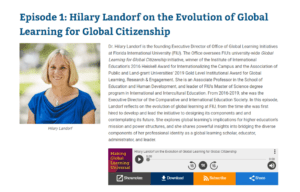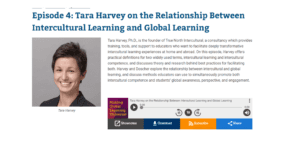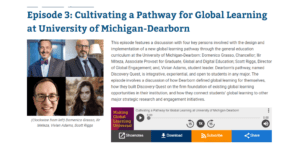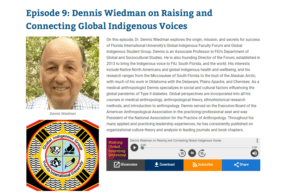Making Global Learning Universal
Episode 1: Hilary Landorf on the Evolution of Global Learning for Global Citizenship
Global Citizenship is a term that challenges one to look beyond themselves. It is a term that makes a person feel a sense of belonging not only to one’s country of origin but also to the entire universe. It can increase a demanding responsibility for the happenings around an individual as there is a deep connection between one and the world. Global Citizenship is a reminder that people are social beings, and whatever they do, be it negative or positive, can have a lasting effect on the world. The evolution of global learning has ignited a desire to learn more about what is happening across the globe. Also, it has ignited the feeling of wanting to know how one can respond to those happenings in a significant and responsible manner. As described by Hilary Landorf in the podcast, global learning has dawned on me a universal awareness that breaks the barriers of culture, language, caste, religion, creed, nations, and borders. Feeling compelled to commit to equality, justice, peace, dignity, and people’s right to life is inevitable. The sense of Global Citizenship can lead one to genuine resource sharing and active collaboration. Through Global Learning, individuals can try to educate themselves more outside the classroom by watching television, reading newspapers, and accessing social networking sites to help them feel a sense of belonging. Teachers should create platforms for discussions that provoke thoughts and create debates on the burning concerns and issues happening worldwide.
Are you interested in an original copy of “Making Global Learning Universal”? Contact us

Episode 1
Episode 4: Tara Harvey on the Relationship between Intercultural Learning and Global Learning
Cultural diversity is a feature highly established in American schools due to population mobility via relocation, migration, and movement of refugees. Cultural difference is part and parcel of life. Encountering people from different cultures and all walks of life every day shows normalcy, and intercultural sensitivity cannot naturally occur since people seek to copy, ignore, or destroy differences, and that is where intercultural learning comes in handy. Professionals in the work environment are constantly encouraged to work in multicultural and diverse environments. Therefore, intercultural practice skills are important to professional competence and knowledge. Universities should ensure that intercultural learning is intertwined. Tara Harvey’s statement that it is important to understand and be aware of how other people experience the world differently from others is an agreeable argument. This means the involvement of intercultural communication, theories, and concepts helps one to deeply understand how others see and experience the world without judging them. However, the ability to expedite comprehensive intercultural learning can pose challenges to instructors who might have to undertake intercultural training before being equipped to teach their students. If higher learning institutions are committed to global learning and intercultural skills are important in this globalized world, people can’t just equip students with intercultural learning via diffusion. Rather it is vital that adequate resources are invested in promoting intercultural and global learning and should not be considered a luxury but a necessity.

Episode 4
Episode 3: Cultivating a Pathway for Global Learning at the University of Michigan-Dearborn
The education practice and discourse have shifted, acknowledging the relevance of learning and education in understanding and resolving global issues in social, cultural, political, environmental, and economic areas. Education’s role is now more than knowledge development; it has moved to build soft skills, values, and attitudes among learners. Today, education facilitates international cooperation and promotes social transformation towards a more peaceful, just, inclusive, tolerant, sustainable, and secure world. In a highly interdependent and interconnected world like this, there needs to be a transformative education at the University of Michigan-Dearborn, which will enable students to resolve the tenacious challenges relating to peace and sustainable development concerning all humanity. Global learning can play a role in resolving challenges such as racism, inequality based on ethnicity, injustice, and poverty, among others. In this globalized world, education emphasizes equipping students with the knowledge, attitudes, skills, and behaviors required to be engaged, informed, and empathetic toward others. Consistently, interconnectedness through ICTs, opportunities for cooperation, collaboration, and shared learning, just like Ilir Meteza states in the podcast, is vita. If students are pulled together to work on complex challenges, they will be better prepared for their future and the world. It is widely accepted that education promotes peace, equality, human rights, diversity tolerance, and sustainable development. It is commendable that Vivian Adams acknowledges that university attendance helps students better themselves and helps them to get the best job opportunities they can.

Episode 3
Episode 9: Dennis Wiedman on Raising and Connecting Global Indigenous Voices
The global Indigenous forum’s mission is to create a space for the voices of Indigenous groups to be listened to, heard, and respected on campus, and it is quite a good course. It is always commendable to try and promote equality for all within an institution. Another way this mission can be promoted is by teaching indigenous languages in a multicultural educational context, which is a way that schools can strengthen indigenous students’ connection to culture and aid universities in fighting racism, and mitigate assumptions that involve indigenous education. It is important to encourage indigenous education in higher learning institutions, and that is by linking the same to indigenous knowledge and culture. Indigenous people feel the relevance of education when universities value, reflect, and integrate their knowledge into the teaching methodologies and the curriculum. Students’ knowledge keeps them in class and gives them employment opportunities. Acknowledging their knowledge in courses can boost their qualifications for many employment opportunities exclusively for indigenous groups. Conclusively, it is recommended to expand options for Indigenous groups through higher learning, and ultimately, higher learning institutions must respect and promote Indigenous people’s perspectives and knowledge because, just like other groups, they have much to offer society. Higher learning institutions should exercise cultural leadership by offering courses enriched by Indigenous perspectives and knowledge and should encourage formations groups such as global indigenous forums to ensure the voices of all students are heard.

Episode 9
Similar Post: Communication Dilemma
ORDER A PLAGIARISM-FREE PAPER HERE
We’ll write everything from scratch
Question
Making Global Learning Universal
Listen to the Making Global Learning Universal podcast, a collection of conversations about engaging diverse perspectives, collaboration, and complex problem-solving in higher education created by Global Learning Director Dr. Stephanie Doscher. To receive credit, listen to an episode, take a screenshot, and write a 250-word reflection. One point per reflection with up to four points awarded!

Making Global Learning Universal
Podcast link:
Listen to 4 different podcasts, write a 250-word reflection for each podcast, and take screenshots of each podcast listened to.

